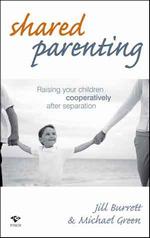Book: Shared Parenting – raising your children cooperatively after separation
Published by Finch: Online purchase details for ‘Shared Parenting – raising your children cooperatively after separation’
 I’ve just finished reading this new book by Australian psychologist Jill Burrett and lawyer / mediator Michael Green. From the very first page it’s clear that the authors are in tune with modern times – this book is presumably a reflection of the positive changes which are taking place in the Australian family law arena.
I’ve just finished reading this new book by Australian psychologist Jill Burrett and lawyer / mediator Michael Green. From the very first page it’s clear that the authors are in tune with modern times – this book is presumably a reflection of the positive changes which are taking place in the Australian family law arena.
The authors say in their introduction:
For far too long there’s been a misplaced belief that children, especially those under 10, are better off with mothers – and this has helped spawn another (hotly debated) the belief: that the legal system disadvantages fathers.
We believe that the situation has seriously disadvantaged children, and that fathers should be more engaged with their children than they have been.
…
We also believe that, for a very long time, gender stereotypes, the system and other complex prejudices have discouraged some fathers and caused others to participate little in parenting, especially after separating.We don’t think fortnightly weekend parenting is meaningful shared parenting. We think that shared parenting means having real chunks of time engaged with your children for a flexible 35 to 50% or more of their available time.
The book outlines the advantages of working cooperatively to develop a suitable parenting plan instead of wasting money and creating stress by fighting in the Family Court. The focus is relentlessly on what is actually best for the children, although it is pretty clear that adults following this advice are much more likely to have a better life as well! There is plenty of research drawn upon, but it as it is referenced in the author’s notes at the back, the book remains an easy read, using language which the reader will not need a university education to understand.
Burrett & Green demolish many of the myths which promote conflict, e.g.: that children need a single stable home, or that ‘quality time’ somehow reduces the need for authoritative and engaged parenting for a significant proportion of the child’ s time. Potential pitfalls and traps are discussed, with the aim of helping people correct their areas of misinformation and question their attitudes and biases. The discussion revolves around practical solutions with regular question and answer sections illustrating the wide variety of conflicts which may need to be dealt with.
The sample parenting plans in chapter 9 are particularly valuable – they provide a template for creating an outcome that takes into account the unique characteristics of each family.
I did find the odd minor jarring note – for instance they suggest that fathers without much hands on experience with children should be “open to the idea of consulting their ex partner, their own mothers and sisters…”
I would suggest that while this may be useful up to a point, woman are NOT a good source of information about how to be a father – men are much better off finding or creating some kind of situation where they can learn this from other men, if they have no father or male relatives of their own available. The idea that women are born with some kind of instinctive knowledge of parenting not available to men is one of the other ‘ misplaced beliefs’ which drive the 20th century-style caught we’re unfortunately stuck with in New Zealand.
This small niggle aside, I strongly recommend this book to all separating parents, and I think community agencies should make copies available to clients who can’t afford to purchase their own.
Another review, including an audio interview with Jill Burrett and Michael Green is at Dads on Air.
It also helps to demonstrate what we have been saying for some time now, that there is a significant cultural shift towards shared parenting both before and after separation – an outbreak of equality and common sense – which legislators have been slow to catch up with.



